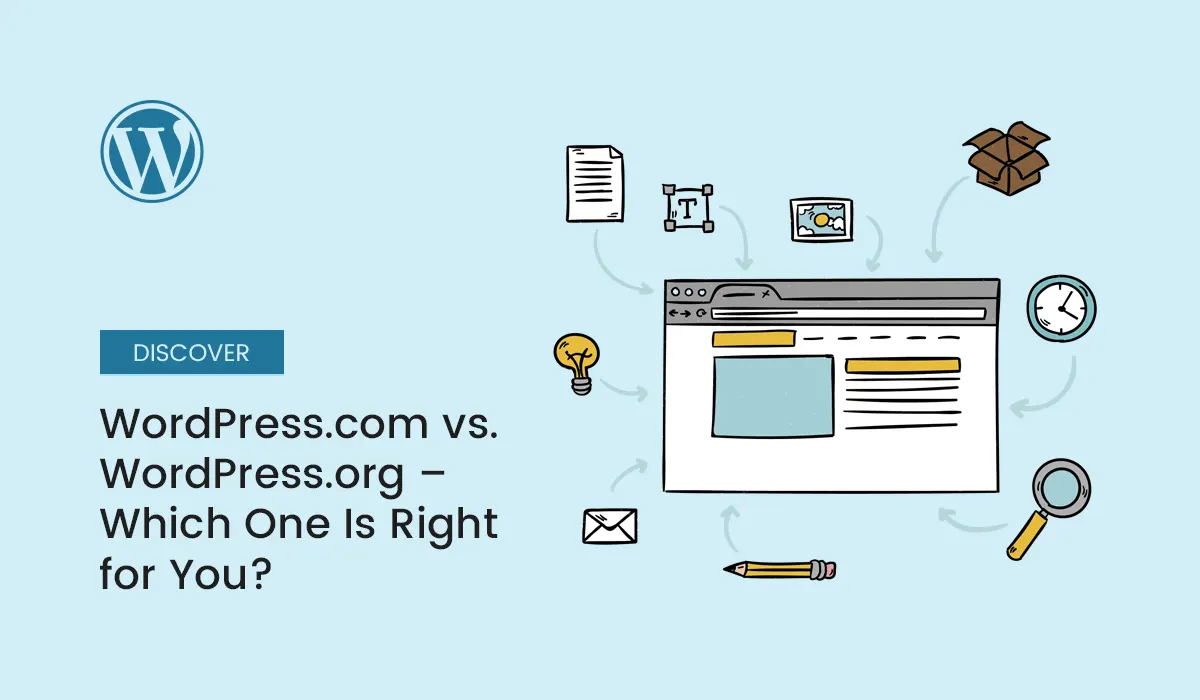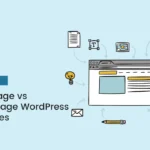Introduction
If you’ve decided to start a website or blog, one of the first questions you’ll face is: Should I use WordPress.com or WordPress.org?
At first glance, they sound almost identical. Many beginners think they’re the same thing—but they’re not. Choosing the wrong version of WordPress can limit your growth, customization, and even how much control you have over your site.
In this guide, we’ll break down the key differences between WordPress.com vs. WordPress.org, explain their pros and cons, and help you decide which one is right for your project in 2025.
What Is WordPress?
Before we dive into the comparison, let’s quickly recap what WordPress actually is.
WordPress is a Content Management System (CMS) that powers over 40% of websites on the internet. It allows users to build websites, publish content, and manage digital assets without needing to code everything from scratch.
However, WordPress comes in two flavors:
- WordPress.org → Self-hosted version where you download WordPress software and install it on your own hosting.
- WordPress.com → Hosted service where WordPress manages the hosting for you.
WordPress.com Overview
WordPress.com is a hosted blogging and website platform owned by Automattic.
Features of WordPress.com
- Hosting is included—no setup required.
- Free subdomain (example: mysite.wordpress.com).
- Paid plans available for custom domains (example: mysite.com).
- Built-in security, backups, and maintenance.
- Limited customization unless you upgrade.
Best For:
- Hobby bloggers.
- Beginners testing WordPress without investing in hosting.
- Small personal projects with no advanced needs.
WordPress.org Overview
WordPress.org is the self-hosted version. You download the free software and install it on your own web hosting provider.
Features of WordPress.org
- Complete control over your website.
- Choose from thousands of free and premium themes.
- Install any plugin to add features.
- Full access to SEO tools and code customization.
- Own your domain and content without restrictions.
Best For:
- Businesses.
- Professional bloggers.
- Online stores.
- Membership websites.
- Anyone serious about growth.
Key Differences Between WordPress.com and WordPress.org
| Feature | WordPress.com | WordPress.org |
|---|---|---|
| Cost | Free basic plan; premium plans available | Free software; hosting & domain required |
| Hosting | Provided by WordPress | Choose your own hosting provider |
| Domain | Free subdomain (yoursite.wordpress.com) | Custom domain (yoursite.com) |
| Customization | Limited (depends on plan) | Unlimited (themes, plugins, custom code) |
| Plugins | Only available on higher paid plans | Install any plugin, free or paid |
| Monetization | Limited; ads shown by WordPress on free plans | Full control (ads, e-commerce, memberships) |
| SEO | Basic SEO on free plan; advanced tools on Business plan | Full SEO control with plugins like Yoast SEO |
| Ownership | Content is hosted by WordPress; subject to their policies | Full ownership of content and data |
Pros and Cons of WordPress.com
Pros:
- No setup required.
- Free hosting option.
- Automatic updates and security.
- Easy to start for beginners.
Cons:
- Limited customization unless you pay.
- Cannot install plugins on free/basic plans.
- WordPress.com shows ads on free sites.
- You don’t have full ownership of your content.
Pros and Cons of WordPress.org
Pros:
- Full control and ownership.
- Access to thousands of plugins and themes.
- Better SEO customization.
- Freedom to monetize however you want.
- Scalable for blogs, businesses, and online stores.
Cons:
- Requires hosting setup.
- You manage updates and backups.
- Learning curve for absolute beginners.
Cost Comparison: WordPress.com vs. WordPress.org
WordPress.com Pricing
- Free plan with subdomain.
- Personal: $4/month (custom domain).
- Premium: $8/month (design customization).
- Business: $25/month (plugins, advanced SEO).
- eCommerce: $45/month (store features).
WordPress.org Costs
- Domain name: ~$10–15 per year.
- Hosting: $3–$10 per month (basic shared hosting).
- Premium themes/plugins: Optional costs.
Verdict: WordPress.org is cheaper in the long run because you pay only for hosting and domain while keeping full freedom.
Which One Should You Choose?
Choose WordPress.com If:
- You want a free or low-cost site with minimal effort.
- You’re a casual blogger or hobbyist.
- You don’t need advanced features.
Choose WordPress.org If:
- You want full control and ownership.
- You’re building a professional website or online business.
- You plan to monetize your site.
- You want access to all plugins, themes, and SEO tools.
Real-World Examples
- WordPress.com Example: A hobby blogger writing personal stories or poetry.
- WordPress.org Example: An online store powered by WooCommerce selling physical products worldwide.
FAQs
Q1: Is WordPress.com really free?
Yes, but with limitations. You’ll have a WordPress subdomain, ads, and limited features.
Q2: Do I own my content on WordPress.com?
Not fully. Your content is subject to their terms of service, and they can remove it if it violates policies.
Q3: Can I move from WordPress.com to WordPress.org later?
Yes, migration is possible, but it may require technical steps.
Q4: Which one is better for SEO?
WordPress.org is better because it allows advanced SEO plugins and full control.
Q5: Which is easier for beginners?
WordPress.com is easier to start, but WordPress.org is more rewarding long-term.
Conclusion
Both WordPress.com and WordPress.org have their place in the website-building world.
- If you want a simple, no-fuss platform for casual blogging, WordPress.com is fine.
- If you want to create a professional, scalable, and customizable website, WordPress.org is the best choice.
For most serious bloggers, businesses, and entrepreneurs in 2025, WordPress.org is the recommended option.
Ready to take control of your website? Discover the freedom of WordPress.com vs WordPress.org and choose the best platform to build your online presence today!




